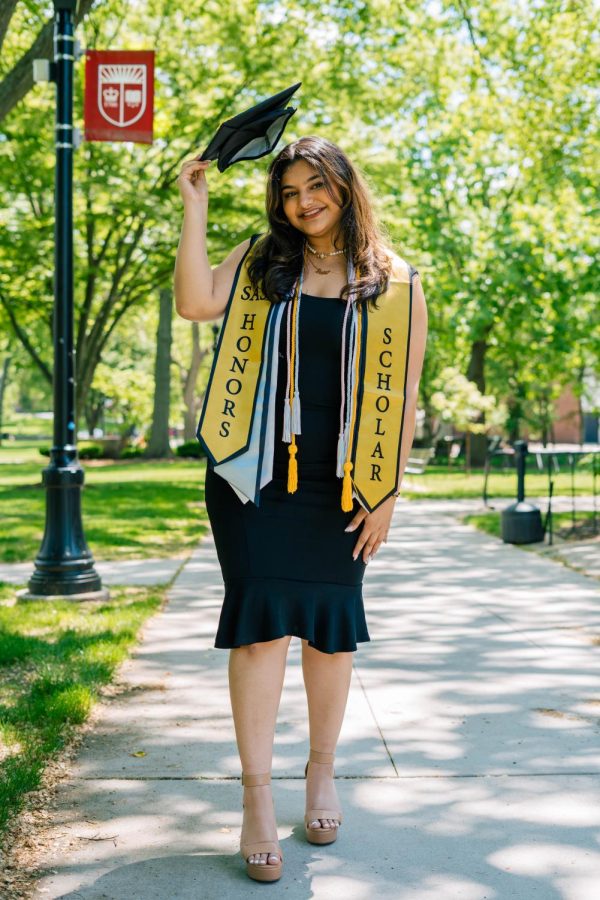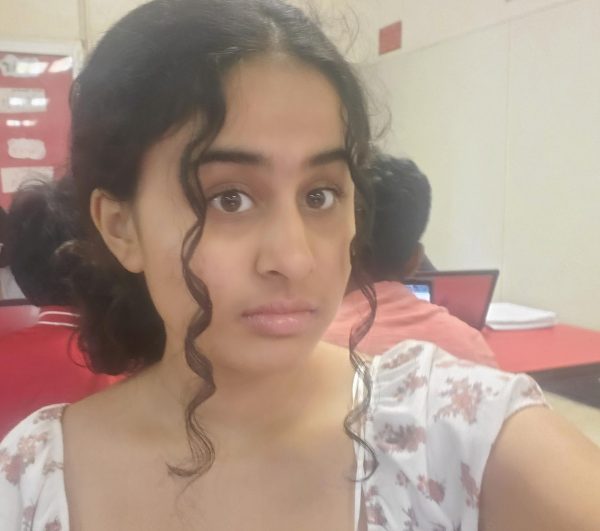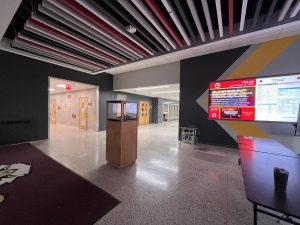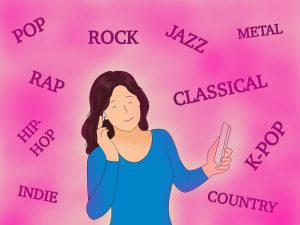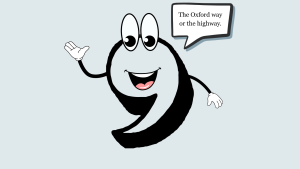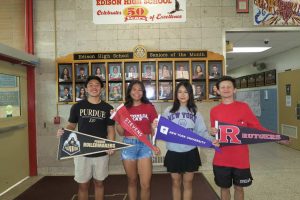A Call From Eagles Out of the Nest: Parthi Dasondi
February 14, 2022
Parthi Dasondi ‘17 is definitely not your typical STEM alum. There is a stereotype that a STEM student will decide to find a job in fields related to math and science. And many times, this stereotype proves to be true. But what about those STEM students that turn away from these expectations?
A star student and a STEM academy alum, Dasondi was involved in multiple activities: Peacock Society, volleyball, track & field, Model UN, National Language Honors Society, National Math Honors Society, Science National Honors Society, National English Honors Society, student council, and National Art Honor Society. She also took many AP classes—biology, chemistry, world history, and physics are just a few.
Dasondi graduated from Rutgers University back in May 2021, magna cum laude, with a major in Biological Sciences, and a double minor in Cognitive Science and Creative Writing in the SAS Honors Program. Now, after taking two gap years, she works full time at an NYC-based company: Choice Logistics. Choice Logistics mainly specializes in risk and compliance law, which aligns with Dasondi’s aspirations, as she hopes to attend law school in the foreseeable future.
The Eagle’s Eye reached out to Dasondi to learn more about her experiences with EHS, college, and law.
EE: How did EHS influence your decision to step into law, and did you always know you wanted to pursue this field before your time at high school?
PD: When I was in high school, I was a part of STEM, so I wasn’t really pushed in the direction of law. When you take part in STEM, you’re often encouraged to to step into fields such as engineering, which many of my classmates did. Mr. Evans, the AP chemistry teacher, was the one who name-dropped patent law here and there, so if it weren’t for him, I wouldn’t have heard of it. He inspired me to research it more on my own time. However, I never really thought about actually becoming a lawyer, as I was surrounded by people who were interested in engineering and the medical field. My environment influenced me to pursue my major—Biological Sciences—in college, until I realized that medicine wasn’t the field for me. This was when I decided that I wanted to pursue law. I would definitely say that my STEM background helped quite a bit, as it helped to open up more opportunities for me in the future.
EE: Many former students have given insights on the experiences at EHS that altered their mindsets and even lives. Did you ever have an important experience like this during your time in high school, and if so, what did you learn?
PD: I don’t think that there is one gratifying experience that changes your mindset—it has to be a combination. I think what I learned from EHS is that having close relationships with your teachers is always a good idea. They always have so much to teach you about life in general, and they are the ones who shape your future as well. How I viewed my relationships with my high school teachers influenced my relationships with my college professors. If it weren’t for some of my high school teachers, I would not have started to research law, and I wouldn’t be where I am today.
EE: What is a piece of advice you wish you were given before starting college?
PD: There were a lot of things I wish I knew when I started college. However, one piece of advice that I wish I was given and that I continue to give is that you cannot compare yourself to others. High school and college are both your own individual experiences. You can only be proud of yourself if you take things at your own pace and do not push yourself to do something you regret. This aligns itself with my personal motto, “work smarter, not harder.” Even if somebody scores higher than you on an exam, or even if you fail an exam that they passed with flying colors, you shouldn’t put yourself down and compare yourself to them. At the end of the day, the person who is getting the degree is you.
EE: What are some of the similarities you found between EHS and Rutgers? What are some of the differences?
PD: One similarity between the two schools is that I’m around the same people from EHS, as well as some from JP. So sometimes, it just feels like an extension of high school. I continue to work my hardest at Rutgers and meet new people, just like I did at EHS. Of course, there are differences as well. EHS is very routine, while Rutgers is often all over the place. The number of classes fluctuates every day as well. I also found that at Rutgers, there are many more opportunities to explore. I guess you can say that EHS gave me the chance to expand my horizons, while Rutgers offered me the opportunity to build who I am.
EE: You took both engineering with Mr. Kerins and visual arts with Ms. Gavor—which elective did you prefer and why?
PD: I honestly don’t think that I can pick between those two. I took engineering for four years, so I had Mr. Kerins throughout high school. When you’re a part of STEM, you can’t take anything else besides engineering. However, that doesn’t mean that engineering wasn’t fun, because we had all of these amazing experiments that we could perform. I took art in senior year, when I was allowed to pick a second elective. I loved taking art in senior year, because it allowed me to explore something other than what I had been doing for the past three years, and I created some of my best work in that class, along with engineering. Art also gave me the opportunity to make new friends, since I wasn’t with the same people all the time anymore. In short, I can’t pick between the two, because they were both different and important experiences that taught me a lot.
EE: Why did you decide to take two gap years? Why or why wouldn’t you recommend this decision to somebody else?
PD: I think that taking a gap year, or however many gap years you want to take, is a personal decision. In fact, very few people directly go into law school after getting their degree. Personally, I took a very intensive major. Biological Sciences was not easy, and I took many classes during my time at Rutgers. I didn’t want to just jump into law school and be burnt out. I really wanted to have some work experience beforehand. This decision also worked for me because to get into law school, you just have to take the LSAT—it doesn’t matter how old you are or what you major in. Basically, taking a gap year depends on what you want to do. My advice would be if you want to go to grad school, consider taking a gap year, or however many gap years you want. Gap years can also help you to decide what you really want to do with your life, but at the end of the day, it is a personal decision since not everyone is walking on the same path.
EE: Your college experience was interrupted by the COVID-19 pandemic. What were the positives and negatives of this situation, and how were you able to turn the negatives into positives?
PD: I think that having COVID hit during my last two years of college was really disappointing. I was looking forward to studying abroad senior year—I was going to go to Rome for six weeks. Of course, that ended up getting canceled since Italy was one of the first countries to get hit by the pandemic. I was also looking forward to living on campus with my college friends, which obviously ended up being canceled as well. However, there were a few positives as well. I learned new ways of studying, and I took some really interesting classes as well. One was a film class and the other was a Ruth Bader Ginsberg class. I was also lucky enough to meet many new people during remote learning as well. Of course, though I really enjoyed the positives in this situation, I would have preferred to be in-person during my last two years.
EE: What clubs, opportunities, and/or organizations would you recommend to EHS students who want to step into law?
PD: Personally, I didn’t take a lot of clubs during my time at EHS. However, I think that Model UN is really important if you’re considering a career in law. It is a good experience, as you represent a country during the conferences and argue for them. It really helps you gain important skills, such as writing and maintaining decorum. It kind of gives you insight into a courtroom, and you do get that feel. Of course, Model UN isn’t a legal club, but there are many great skills to gain from that. You also gain confidence and public speaking skills, and you learn how to work with people who you may not agree with. All of this really helps you in law school and in the courtroom itself. So, I would definitely recommend Model UN if you want to step into law. National English Honors Society also helps, because it helps you to develop the important writing skills that you need as a lawyer. I also think being a part of Peacock Society has helped. Being a part of events such as Fusion really helps to bring you out of your comfort zone. Not to mention, you continuously get opportunities to interact with other people, which is also a super important part of being a lawyer.
EE: You participated in a plethora of clubs and societies during your time at EHS. Not to mention, you had countless AP classes to handle as well. What time management skills did you develop, and how were you successfully able to implement these skills later on?
PD: Having and maintaining a routine is extremely important. High school is pretty much all laid out for you. As my classes progressed, I had to tweak my schedule a little bit so I could still make time for my clubs, studying, homework, and relaxation. I also think that using my study hall to complete work is also very important, because I personally am not somebody who likes to stay up past 12 AM doing homework. It’s a little bit different in college, because not everything is laid out for you. However, college is still great for you to maintain your routine, even if your schedule is all over the place.
EE: What abilities did you gain from being part of STEM?
PD: From being apart of STEM, I really learned how to be a part of a team. We would constantly do team projects, especially in engineering. I also learned many time management skills. My senior year, I had to complete a capstone project with my partner. Now, this wasn’t something that we could just finish in a month, so we learned how to split up our time properly. My innovation skills that I learned during STEM also helped, and my partner and I were able to build a web-app that would light up a light prototype through the use of Raspberry Pi once we clicked a button. Communication was also an important skill that I learned—had we not communicated our feedback to our teachers, the STEM academy would not be where it is today.
EE: What were other potential majors you had in mind while at EHS? Why did you decide against pursuing them?
PD: I was always interested in neuroscience, and I never really considered other majors for a while. Thanks to STEM, I also considered engineering, and even chemistry, which I wasn’t good at when I was first starting out. I never stopped being interested in neuroscience, but I didn’t major in it because the major at Rutgers was cell biology and neuroscience, and cell biology was very specific. It was so specific that the only people I knew who were taking it were the pre-med students. Of course, I did still take neuroscience classes, but I didn’t think of that as a career path anymore.
EE: Based on your past experiences and current values, what are some parting words you would like to give to students, especially future law students, here at EHS?
PD: I think that what I want to say is that it’s okay to not know exactly what you’re doing when you enter college. You don’t have to know exactly what you want to major in or what field you want to go into. Give yourself the time to take different classes and make smart choices for yourself. Not everything is going to be cut out for you, so it’s important to explore everything. As for the future law school students, you don’t have to pursue a typical law major and then go to law school. If you want to, you can pursue a dance major and go to law school. Don’t let the generics of law school decide what you major in, and decide for yourself. Also, it’s easy to cut yourself down when doing something hard, and it’s easy to think that you’ve never accomplish anything. It’s important to know that you have important accomplishments and experiences under your belt that will get you on the road to success. In short, make sure to carve out your own path, and continue to work smarter, not harder.
















































































